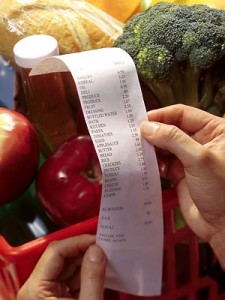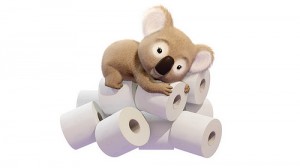BPA (Bisphenol-A) is one of the most prevalent endocrine disruptors that we are exposed to in our every day lives. Most people have heard that BPA is in plastic food packaging, water and baby bottles, but some other sources are less known. These surprising ways we are exposed to BPA may possibly be the worst because we don’t yet know to avoid them.
Education is the most important thing we can do for ourselves and our children in the fight to reduce toxic chemical exposures. We may not be able to protect ourselves from everything, but we can take simple steps minimize our exposure to BPA when we just know how.
 photo credit:Alliance for Natural Health USA
photo credit:Alliance for Natural Health USA
1. Thermal Paper Receipts
BPA is not found in all receipts. BPA is not inherent in the paper, but is often used in the thermal paper receipts as a color developer. You might get these receipts at major retailers, grocery stores, ATM machines, fast-food restaurants, and more. The main problem with the BPA on these receipts is that it is “free BPA” meaning it isn’t chemically bound to anything like in polycarbonate and so easily rubs off on the skin and can be easily absorbed through the skin or when fingers touch food or the mouth.
The amount of BPA, by mass, on these receipts is 250 to 1,000 times greater than the amount of BPA typically found in a can of food. How many times have you given your child the receipt to hold when leaving Costco so they can get the smiley face drawn on it when leaving? When I think of how often we, and our children, are handling these types of receipts… I can’t even finish that thought. But there are some easy ways to avoid BPA in paper receipts.
Tips to reduce exposure to BPA in receipts (many from EWG):
- Minimize receipt collection by declining receipts at gas pumps, ATMs and other machines when possible.
- Store receipts separately in an envelope in a wallet or purse.
- Never give a child a receipt to hold or play with.
- After handling a receipt, wash hands, especially before preparing and eating food (a universally recommended practice even for those who have not handled receipts).
- Do not use alcohol-based hand cleaners after handling receipts. A recent study showed that these products can increase the skin’s BPA absorption (Biedermann 2010).
- Take advantage of store services that email or archive paperless purchase records.
- Do not recycle receipts and other thermal paper. BPA residues from receipts will contaminate recycled paper.
- If you are unsure, check whether paper is thermally treated by rubbing it with a coin. Thermal paper discolors with the friction; conventional paper does not.
- Recently, the largest manufacturer of thermal paper has made it easier to see when the paper is BPA-free by adding small red fibers in the paper.
- Contact your favorite retailers and let them know you don’t want BPA-laden receipts. Some that do are McDonald’s, CVS, KFC, Whole Foods, Wal-Mart, Safeway. Be sure to let them know there are BPA-free alternatives.
- Contact your favorite retailers that choose BPA-free receipts or paper-free choices and let them know your appreciation! Some that use BPA-free receipts are Target and Starbucks.
 photo credit:flickr
photo credit:flickr
2. Recycled Paper Products.
There have been particular studies done on toilet paper made from recycled paper due to an examination of the BPA that was being found in wastewater streams. The study found that toilet paper was the reason for the accumulation of BPA in the water and that the amount was so large that the recommendation was to not allow recycled paper products to be mixed with biological waste to produce organic fertilizer. This concerns me. Other studies indicate that the recycling process can release BPA directly to surface water. This deeply concerns me.
I don’t believe that the process to recycle paper is inherently flawed, especially since the sources of the BPA contamination are largely from the BPA-tainted receipts (see above). The answer could be as simple as avoiding recycling the sources of BPA into our recycled paper products, but I fear it is much more complex than that. I still believe in recycled paper, but we need to have all the information in order to make educated choices. Other recycled paper products include: food containers, paper towels, computer paper, pizza boxes, cups, napkins, coffee filters, and more.
Tips to reduce exposure to BPA in recycled paper products:
- Reduce consumption of all paper products whenever possible.
- Ditch the disposables whenever possible: cloth toilet wipes (or try a bidet!), cloth baby and toddler wipes, cloth un-paper towels, menstrual products, use non-wood paper alternatives (like hemp or banana paper, Elephant Poo, or handmade paper from natural fibers).
- Use (and bring) your own food and drink containers when going to restaurants, getting take-out, or for use when out and about.
- Choose paperless billing.
- Do not print emails and other forms that can be submitted online.
- Don’t recycle receipts or other thermal paper (see above).
- Ask manufacturers and retailers about any recycled paper products they use so you can choose how to handle them (or not).
- Most importantly to me, is to reduce children’s exposure to the BPA in these products. They are much more vulnerable and stand a much greater chance of avoiding the adverse health effects if we can limit their exposure than adults who have accumulated a lifetime of toxic body burden.
- Contact local recycling programs and legislators about removing BPA-tainted thermal paper from the paper recycling process. Then take it a step farther and work to reduce the use of BPA-tainted thermal paper at all.
I was told recently by a commenter that she cannot live in fear all the time from these things. I wholeheartedly agree. The whole point of my blog is “Exploring how to improve and protect the health of our children and their world through living, learning, and parenting…”. There is no room for fear here. There is education and there are choices. There are also environmental causes for many of the health problems we are seeing in modern society.
I don’t believe that parents should have to spend hours researching safer choices because it is never clear what is safe and what is not right on the package. We should be able to buy products that are safe for ourselves and our children. If they are not, we should at least be aware enough to make the decision to go ahead and buy them, or not.
A good friend of mine also told me today after much discussion recently about endocrine disruptors and other things, “How can I accept that the entire structure of our society is fatally flawed without also acknowledging that my whole way of life is unacceptable?”
The only thing I could tell her, and what I would impart to anyone new reading here is, “To its core, I think that because you ARE willing to learn more, do better, and realize you aren’t perfect within our societal system as it is now, you can accept it with the condition that you DO expect more from yourself and others. That is without stress and pressure, or undue judgment, but simply as it is. That is how I get through it anyway.”
I don’t give up because it is hard, because the information is scary, because the potential for harm from toxic chemicals being produced without adequate safety measures is great… I don’t give up.
How do you get through this information? Are you one to simply say that everything must be toxic then and there is nothing we can do about it? Are you one to take action? Are you one to learn more and share with others?


My mouth is still wide open….I can't believe what I just read. I usually don't take my receipts as I check my transactions daily online, but WOW this is alarming.
Now that I actually think about the recycled products it all makes sense. They are made from recycled plastic. We might be saving the environment, but we are killing ourselves.
I will be sharing this post in my Sunday – Best of the web this week if you don't mind.
I would be grateful if you would share this with other people!
I am still unsure of what the best solution might be besides simply consuming and producing less. I hate to think of producing new paper products from virgin trees, but also can't accept that we are harming ourselves through the recycling process either. My only hope is more and more and more education! That is the only way we will be able to effect change.
Whoa. This is really shocking and needs to be read by as many people as possible!!
Very informational and helpful!!!!
Feeling bad that I let my 19 month old daughter play w/ our receipt from Target, and then proceeded to use alcohol based hand sanitizer before lunch – thinking that my activities are harmless!!!!
Thank you Maura. Remember that Target is one of the major retailers that uses either BPA-free or paper with minimal amounts of BPA, so try not to worry too much about that. ;) Moving forward though, try to see if you can tell which of the stores you frequent have the thermal paper receipts and see if they use BPA as the color developer.
Wow! thanks for all the info. I have NO idea about any of that. Kids around my area collect receipts for school all the time and the stores give back money. I know I'll be asking stores to use the right kinds of paper.
It would at least be helpful to know which stores have BPA in their receipts. Perhaps then the kids could take proper precautions with those, or let their parents handle them instead.
scary!!!!! I thought I had eliminated BPA from our lives when I stopped buying water bottles!
This pot is incredibly informative – thank you for sharing all of this. I am simply blown away by this.
To answer your questions, I get through this information one bit at a time. At first learning all of these types of frightening facts can feel overwhelming, but as I delve deeper and deeper into this learning process it seems to all start to connect. The most frightening thing to consider, for most of us, as your friend realized, is that this information drives us to point where ultimately the solution is to change the way we live. Change is rough, and many people will structure their lives in a way to avoid it at all costs, however, THIS change that we need to make for our own health and safety is intriguing. The solution, I think, is to embrace a SIMPLER way of life. I can write about this for hours on end, but I believe that is the key. The problem is that simple does not equal convenient.
I like to take action. I try to avoid things that will harm me and my family, but at times that is made more difficult because everything around me caters to convenience. I am learning where to go, what to do and how to live one step at a time. Your post challenges me to take a new action: refuse receipts. That doesn't seem so bad. It seems… Simple :)
Thanks again.
Best,
Nicole :)
Thanks for visiting my blog last week!
I did not know about BPA sources. Thanks for the heads up!
Very informative. I hadn’t heard any of this before. Oh brother! Now what! I recycle all the time. Refusing receipts when I can is easy. That I can do. Thank you and thanks for your comment on my blog. I love your natural highs. They are so important to our well being.
“Inspiration To Lead Healthier And Wealhier Lives”
http://www.reallifeinaminute.blogspot.com
Ugh, I had heard that about receipts but didn’t know how much was there. And I almost always use hand sanitizer after leaving the store. Just switched to a natural one though…
Did you also know that when you take your children to the dentist to have their teeth sealed (to help prevent cavities) there is a high content of BPAs there too?
Any parent having this done should ask for a dental dam to be placed before to minimize the amount they are exposed to.
Thanks for this great post! It is so difficult to find reliable information about BPA and its presence in our day-to-day lives.
It sometimes feels as if we are in the disinformation age, not the other way around. Alas, we were unable to avoid BPA in the early days of our kids’ lives – but now we take extra care to avoid it as much as we can.
I learned something useful today, thanks a million.
Read Aloud Dad
Pingback: The Safe Chemicals Act of 2011 for chemical safety reform |
I am trying to find more information about BPA. From what I have heard it is present in the coating inside some cans of food. (The coating protects food from tasting metallic) Does anyone have anymore info about this? Thanks!
Hi ram8! Yes, nearly all cans for canned food are lined with BPA. You can read more about BPA and other endocrine disruptors here: http://www.almostallthetruth.com/2011/02/endocrine-disruption-why-should-we-care/
Eden Organic is the only brand I am aware of that is fully BPA-free, although I know others have begun to work on that. Trader Joe’s has many BPA-free canned foods. I am a vegetarian and can’t vouch for any of the seafood or canned meat because I haven’t looked into those, but I believe there are a couple of brands that have gone BPA-free.
Eden Organic also carries tomatoes in glass jars to avoid the canned food issue. Glass is a great way to avoid BPA, although there may be a small amount in the jar lid.
Another source that recently horrified me… my canning lids are lined with bpa. This may be better than a whole can lined with bpa but the boiling process at the end of canning allows water to boil up against the lids and potentially release the bpa. Lovely, eh? Just when you think that home canning is the safe way to go…
Thanks for your post. Very informative.
My Mom,Sister, and I have all worked for a grocery chain, each for about ten years, as cashiers and handled this type of receipt paper for at least 8hrs a day, five days a week. Large orders (typical cart full) take about four/five minutes at the most, small perhaps two. So if I average the big and small orders, and hours/days/weeks/years, I’ve handled just at my JOB, not to mention off work shopping, 436,800 of these receipts. This scares me. Thermal paper made changing the tape go from being a tedious process of weaving the paper through the printer to just dropping it in, but was it really worth it?